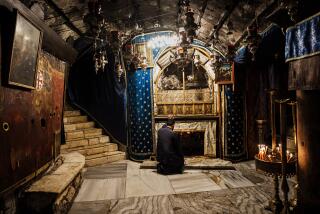COLUMN ONE : In Mideast, a Christian Exodus : Political, economic and religious frictions have driven thousands away. It’s sapping the church’s strength in the region where it was born.
- Share via
AMMAN, Jordan — When President Saddam Hussein said Iraqis could leave their country for only the second time in more than 10 years of war, the Christians were at the head of the line.
An estimated 30,000 Iraqis--a high percentage of them Christians--are now filling hotels and apartments here in the Jordanian capital. Many spend their days at Western consulates, hoping for a visa that will let them leave the Middle East, perhaps for good.
“I just want a better life for my family, my wife and two daughters,” said an Iraqi businessman, a Christian, seeking help at the local office of the U.N. High Commissioner for Refugees. “You cannot live in Baghdad now. There is very little, and the prices are too high.”
His plight reflects a serious problem for the faith in the Middle East. If the Christians leave, where does that leave the church?
War, instability, economic hardship and growing signs of friction with Muslim majorities have been pushing Christians onto the emigration road for decades. The Persian Gulf calamity is but the latest to shake their confidence about a future in the region where their religion was born.
Church leaders agree that the root problem is not religious discrimination but general political unrest and hard economic times. Many people want out of the Middle East, including some Muslims and Jews.
But it is the Christians who have been able to leave in higher percentages, helped by their family connections abroad, a better understanding of the West and good educational backgrounds. These are qualities Western countries seek in immigrants.
While emigration may help individual Christian families, however, it is draining the strength of the church in the Middle East. Historic Christian communities are shrinking in many areas, a trend that alarms leaders of the faith. A church without parishioners is little more than an artifact, an empty building.
Clerics are increasingly disheartened. “I give Christianity 10 to 15 years in Jordan and the West Bank, no more,” Anglican Bishop Elia Khouri has said.
Salim Khalilieh, executive director of the Middle East Council of Churches in Amman, said in an interview that the ranks of Christians on both sides of the Jordan River have fallen from 400,000 to 170,000 since the 1960s.
“Many Christian families have simply disappeared from the Middle Eastern map,” he remarked, noting that he alone of nine brothers and sisters from the West Bank town of Beit Jala, near Bethlehem, has stayed on. His siblings now live in Toronto, Cincinnati and West Virginia.
Church leaders worry about popular assumptions in Europe and the Americas that the Middle East is a sea of Muslims and an island of Jews.
Christianity, born in the region 2,000 years ago, is no longer seen as part of the cultural mosaic. Ranking clerics like Archbishop Aram Kesheshian of the Armenian Orthodox Church fear that the view from the West could become a self-fulfilling prophecy, that outside support for the church in the region will die. “We are not guests in the Middle East,” Kesheshian said. “We were here six centuries before Islam. We are not an aberration. We belong.”
In total, Christians number about 9 million--including more than 5 million Egyptian Copts--out of an estimated 300 million people in the overwhelmingly Muslim states of North Africa and the Middle East. Estimates of the Christian population specifically in the Middle East range from 5% to 10%.
The percentage of the population varies from nearly half in Lebanon to less than 1% in some Arab countries. But in most Middle Eastern states, the Christians are a hard-working minority, usually with their own church schools and well-represented in the professions and business. Some have political influence, as well. Christians, for instance, were instrumental in developing the ideology of the Arab Baath Socialist Party that rules in Syria and Iraq.
Continued emigration may remove a small but significant sector of the region’s economic ranks. Business people will withdraw their capital and investments. “But that’s not going to make such a big difference,” said the Rev. Douglas DuCharme of the Middle East Council of Churches, in Cyprus. He and other officials are more concerned about the continued existence of the church itself. Gabriel Habib, general secretary of the council, says emigration has threatened the “continuity of Christian presence and witness in this region.”
Church officials and others point to Jerusalem as a good example of the numbers problem. Jerusalem is a holy city to Christianity, Judaism and Islam--the three great monotheistic religions. In 1922, more than half of Jerusalem’s residents were Christians; half a century later, in the ethnically mixed sector of East Jerusalem, roughly the same territory of the 1922 city, they numbered less than 10%, falling in both percentage and absolute numbers.
As Israeli writer Amos Elon remarked, Jerusalem may soon be “bereft of Christianity as a living religion,” housing only the sacred churches of the Old City and other icons of the faith for passing tourists.
The Rev. Donald Wagner, a Presbyterian minister from Chicago writing in a Council of Churches periodical, pointed not only to the Jerusalem numbers but to the nearby Palestinian Christian cities of Ramallah and Bethlehem in the West Bank. More than half their Christian residents have emigrated to Europe and the Americas in recent years, he said, noting that there are more Bethlehem-born Christians living in Chile and Brazil than in the birthplace of Christ.
The Mideast churches’ council has attempted to raise the Christian profile--and attract Western attention--with ecumenical programs among Protestant, Catholic and Orthodox churches. Meanwhile, a small but growing evangelical movement of Baptists, Pentecostals and independent missionaries is gathering supporters in Lebanon, Jordan and the West Bank.
Nevertheless, the emigration trend continues.
Church leaders insist that persecution is not the problem, although the picture is dotted with examples to the contrary. In Egypt, for instance, Muslim fundamentalists have clashed with Christian Copts in countryside villages, primarily over economic competition, although the lines are drawn by religion. And strict Islamic states like Saudi Arabia have actively controlled the growth of the faith. In Saudi Arabia, conversions to Christianity are prohibited, and the only Christians there are foreign workers. Interfaith marriages are also forbidden.
Meantime, more cosmopolitan societies like Syria present a colorful parade of religious--though not political--tolerance. Christians represent more than 9% of the Syrian population, and priests include the black-robed, bejeweled clerics of the Eastern and Oriental Orthodox faiths; the Catholic Melchites, Maronites and Latin Rites; and ministers of familiar Protestant churches such as the Nazarenes and Seventh-day Adventists.
In Tehran, mosques predominate but drivers can find an address by church location, as in, “It’s across from the Armenian church, the one with the big steeple.” Like Tehran, many Middle Eastern capitals have well-defined Christian districts.
Christians have done well in secular Iraq, where Hussein has played down religious divisions in trying to rule a society already ethnically fractured. The role model usually put forward is Tarik Aziz, deputy prime minister and former foreign minister, who is a member of the country’s largest Christian community, the Chaldean Catholics.
Msgr. Marian Oles, the Vatican’s representative in Baghdad, said the estimated 343,000 Iraqi Christians, about 2.5% of the population, “are enterprising and clannish.” They live without unusual restrictions and have done well in the army and other branches of government, the Polish papal nuncio said.
Despite the advantages of life under a secular regime, however, many Christians--and many Muslims--want to leave Hussein’s Iraq. The problem is war. In his 20 years in power, Hussein has plunged the country into conflict with Kurds, Iranians and, finally, the U.S.-led coalition in the Gulf. “This (leaving Iraq) is not a religious question, this is survival,” an Iraqi Christian told a Jordanian reporter in Amman.
Khalilieh, the head of the Council of Churches in Jordan, pointed to another political factor encouraging emigration: the continuing conflict between Israel and the Arab states.
In the view of the former Jordanian general-turned-churchman, Muslims see the United States and Europe as Christian powers, and their support for Israel has led to “a little discrimination” against Jordanian Christians. Worsened economic conditions have increased competition for jobs, and private employers and government ministries have favored Muslim applicants, he said.
Christian “people are afraid for their future,” Khalilieh added. “The policy of the U.S. government in support of Israel affects us as Christian Arabs. On human terms, we (Christians and Muslims) are friends. When there is a (political) crisis, the feelings change.”
DuCharme, the Council of Churches official in Cyprus, agreed, saying: “The issue is not emigration. The issue is the lack of peace. The issue is the lack of justice. Emigration is just the focal point.”
But failing a political solution that brings peace to the Middle East, Christians are likely to continue to seek a way out. And immigration officers from Canada, Australia, Brazil and other countries seeking to boost their populations will probably look to Christians first, not on the basis of their religion but on their qualifications.
Centuries of missionary schooling by Western priests have given the Christians of the Middle East a more worldly outlook and, often, fluency in some European language, in addition to Arabic. Many also have relatives living in the West. In the 1960s, for instance, a surge of Iraqi emigration sent Christians to Michigan, California and elsewhere in the United States. A relative in America can send money to those at home to finance travel abroad.
Some Middle East church officials console themselves by arguing that the emigration trends may be temporary, pointing to the return to Lebanon of large numbers of Maronites over the past few months as the Syrian-backed Beirut government established security over a wide area of the country.
But many Lebanese insist that any new outbreak of conflict will persuade the Maronites, the region’s most politically powerful Christian community, to call it quits for good.
“My husband already has our money outside, in Brazil,” said a woman from the Christian port of Juniyah. “Our kids have missed two years of school. How many more chances can we give it?”
With the exception of Lebanon, the violent history of the Middle East in the past half-century has not specifically pitted Muslim against Christian, despite occasional extremist calls for jihad , or holy war, against any community that refuses to accept Islam. During the Gulf War, however, the Iraqi camp began to sprinkle its propaganda with references to Americans as latter-day Crusaders, the European armies under Christian banners that tried to retake the Holy Land from Muslim rule eight centuries ago. Images die hard in this part of the world.
Meanwhile, despite Christian efforts to maintain their numbers, influence and historical presence in the lands where Christ and his apostles lived and preached, the drain continues and the atmosphere is downbeat.
Riah Abu Assal, rector of Christ Evangelical Anglican Church in Nazareth, Israel, addressing the overseas community, said: “We do not need your missionaries coming here. We need your help to declare a desperate need for a Christian aliya ,” using the Hebrew word for a remigration of the faithful.
“Only this will save Christianity in the Holy Land.”
Christians in the Middle East
Country Total Christians % of Population Algeria 82,000 0.43 Bahrain 5,200 1.43 Egypt 5,261,000 12.18 Iran 256,850 0.62 Iraq 343,970 2.48 Israel 95,550 2.73 West Bank, Gaza, East Jerusalem 68,850 4.11 Jordan 128,050 5.65 Kuwait 41,150 2.70 Lebanon 1,345,950 44.83 Libya 35,340 0.14 Morocco 114,500 0.54 Oman 1,655 0.18 Saudi Arabia 14,500 0.14 Sudan 71,950 3.69 Syria 864,000 9.29 Tunisia 6,025 NA Turkey 127,000 0.28 UAE 10,050 1.02 Yemen NA NA
Source: “A Guide to Christian Churches in the Middle East,” by Norman A. Horner, published by Mission Focus, Elkhart, Ind.
More to Read
Sign up for Essential California
The most important California stories and recommendations in your inbox every morning.
You may occasionally receive promotional content from the Los Angeles Times.













